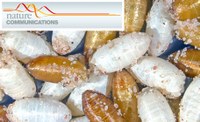Dr. Roswitha A. Aumann

Office: TIG / 2.40
Justus Liebig University Giessen
Institute for Insect Biotechnology
Department of Insect Biotechnology in Plant Protection
Winchester Str. 2
35394 Giessen
Curriculum Vitae
|
|
|
|---|---|
| 2021 - to date | Postdoc, Molecular Genetics & Insect Pest Control, Insect Biotechnology in Plant Protection, Justus-Liebig-University Giessen, Germany |
| 2017 - 2021 |
Ph.D. researcher at Department of Insect Biotechnology in Plant Protection, Justus-Liebig-University Giessen, Germany Ph.D. Topic: Development of CRISPR/Cas9-based tools and strains to improve the Sterile Insect Technique in the Mediterranean fruit fly, Ceratitis capitata. |
| 2013 - 2017 | MSc Agricultural Biology, major in Agrobiotechnology; University of Hohenheim, Germany Master thesis at the Institute for Plant Physiology and Biotechnology: "Dimerization of the oxophytodienicacid reductase 3 in dependence of a posttranslational modification and its importance during dry stress in Arabidopsis thaliana“ |
| 2010 - 2013 |
BSc Agricultural Sciences; Technische Universität München, Wissenschaftszentrum Weihenstephan, Germany Bachelor thesis in the department of animal breeding: "Evaluation of potential premature stop-mutations in the bovine genome“ |
Following my interest and fascination for biology and applied research, I studied Agricultural Sciences and Agrobiotechnology. During my PhD, I developed CRISPR-Cas9 based genome engineering techniques for the agricultural pest insect Ceratitis capitata, which is a polyphagous and highly invasive insect pest causing vast economic damage in horticultural systems worldwide. Currently, I'm working on the development of 'neo-classical genetic sexing strains' for Ceratitis captiata, to improve and 'boost' the Sterile Insect Technique for medfly and other pest insects.
Ph.D. Project
Development of CRISPR/Cas9-based tools and strains to improve the Sterile Insect Technique in the Mediterranean fruit fly, Ceratitis capitata.
The main idea of my doctoral project was to develop C. capitata strains that can be used for the environmentally friendly pest control strategy called ‘sterile insect technique’ (SIT).

One topic of my Ph.D. was dealing with the white pupae phenomenon in Tephritids. The discovery of a spontaneous mutation, white pupae, facilitated constructing the first ‘genetic sexing strain’ (GSS) for a major horticultural pest, Ceratitis capitata (Mediterranean fruit fly) (~1985). In contrast to the natural brown pupal case, white pupae mutants show a vibrant white puparium. However, the molecular basis of the trait used for pest control remained unknown, and the generation of GSS in other species relied on finding spontaneous mutations.
Using classical and modern genetic approaches, we were able to identify and functionally characterize the white pupae gene in three distantly related fruit fly species that could lead to the development of novel GSS in invasive insect pests. Read more at Nature Communications, Ward*, Aumann* et al. (2021)
Publications
Sollazzo G, Nikolouli K, Gouvi G, Aumann RA, Schetelig MF, Bourtzis K (2024) Deep orange gene editing triggers temperature-sensitive lethal phenotypes in Ceratitis capitata. BMC Biotechnol. 1;24(1):7.
Sollazzo G, Gouvi G, Nikolouli K, Aumann RA, Djambazian H, Whitehead MA, Berube P, Chen SH, Tsiamis G, Darby AC, Ragoussis J, Schetelig MF, Bourtzis K (2023) Genomic and cytogenetic analysis of the Ceratitis capitata temperature-sensitive lethal region. G3, 13(6):jkad074
Yan Y, Aumann RA, Häcker I, Schetelig MF (2022) CRISPR-based genetic control strategies for insect pests. Journal of Integrative Agriculture. https://doi.org/10.1016/j.jia.2022.11.003
Ward CM*, Aumann RA*, Whitehead MA, Nikolouli K, Leveque G, Gouvi G, Fung E, Reiling SJ, Djambazian H, Hughes MA, Whiteford S, Caceres-Barrios C, Nguyen TNM, Choo A, Crisp P, Sim SB, Geib SM, Marec F, Häcker I, Ragoussis J, Darby AC, Bourtzis K, Baxter SW, Schetelig MF (2021) White pupae phenotype of tephritids is caused by parallel mutations of a MFS transporter. Nature Communications 12:491
Aumann RA, Häcker I, Schetelig MF (2020) Female-to-male sex conversion in Ceratitis capitata by CRISPR/Cas9 HDR-induced point mutations in the sex determination gene transformer-2. Scientific Reports 10:18611.
Aumann RA, Schetelig MF, Häcker I (2018) Highly efficient genome editing by homology-directed repair using Cas9 protein in Ceratitis capitata. Insect Biochemistry and Molecular Biology 101:85-93.
Häcker I, Aumann R, Schetelig MF (2017). Vector control strategies for mosquitoes. Zeitschrift für Naturforschung C 72 (9-10): e11.
(* co-first authorship)
Talks and Poster
- Speaker: 9th meeting of the International Organization for Biological and Integrated Control (IOBC-WPRS) working group ‘Modern Biotechnology in Integrated Plant Production’. 28-30th September 2022, Berlin, Germany. ‘Current and prospective methods to facilitate Sterile Insect Technique programs’
- Speaker: 4th Research Coordination Meeting on ‘Comparing Rearing Efficiency and Competitiveness of Insect Sterile Male Strains Produced by Genetic, Transgenic or Symbiont-based Technologies’, 1-9th December 2019, Adelaide, Australia. ‘Temperature-sensitive point mutation in transformer-2 for sex conversion in Ceratitis capitata’.
- Speaker: 1st Research Coordination Meeting on ‘Generic approach for development of genetic sexing strains for SIT applications’, IAEA Headquarters, Austria. 5-11th October 2019, Vienna. ‘Analysis of putative wp and tsl target regions in Ceratitis capitata’.
- Speaker: 12th GGL Conference on Life Science, Justus-Liebig-University. 4th September 2019, Gießen. ‘The Transformer project. Sex-reversion in Ceratitis capitata via CRISPR/Cas9 gene editing of the transformer-2 gene’. (Presentation award ‘Best Talk’)
- Speaker: INSECTA 2018, 05-07th September 2018, Giessen, Germany. ‘Highly efficient genome editing by HDR using Cas9 protein in Ceratitis capitata’.
- Speaker: Genomchirurgie im Diskurs - Ein Planspiel zu Chancen und Grenzen neuer gentechnischer Methoden. Wissenschaft im Dialog gGmbH‚ 4th May 2018, Ober Ramstadt, Germany. Mit der Genschere gegen Malaria?‘
- Speaker: 3rd Research Coordination Meeting on Comparing Rearing Efficiency and Competitiveness of Insect Sterile Male Strains Produced by Genetic, Transgenic or Symbiont-based Technologies, 18th-22nd June 2018, Mahidol University, Bangkok, Thailand. ‘RMCE and genome editing in Ceratitis capitata‘.
- Speaker: Consultancy Meeting on Isolation of Genetic Markers towards the Development of Generic Methods for the Construction of Genetic Sexing Strains for Sterile Insect Technique Applications, IAEA Headquarters, Austria. 3-5th October 2018, Vienna. ‘Identification of wp/tsl targets and the establishment of HDR in Ceratitis capitata’.
- Poster: Aumann RA, Häcker I, Schetelig MF (2017). Increased genetic stability of transgenic pest control systems through genome editing in insects. 10th GGL Conference on Life Science, Gießen
Awards
- Dissertationsauszeichnung (2022). Dissertationsauszeichnung der JLU Gießen in der Sektion Agrarwissenschaften, Ökotrophologie und Umweltmanagement
- Presentation Award ‘Best Presentation‘ (2019). Presentation: ‘The Transformer project. Sex-reversion in C. capitata via CRISPR/Cas9 gene editing of the transformer-2 gene’. 12th GGL Conference on Life Science, Gießen
- Presentation Award ‘Best Poster’ (2018). Poster: Rewriting the genetic code – highly efficient CRISPR-Cas9 genome editing in Ceratitis capitata. 11th GGL Conference on Life Science, Gießen
Teaching
- MP149: Site-specific genome modification tools
- MP156/MP157: Laboratory course
Links
- 'Isolation of Gene Markers Leads to More Effective, Efficient Insect Pest Control', IAEA News 2021
- 'Fruchtfliegen Ade - wie ein Farb-Gen bei der nachhaltigen Bekämpfung von Schadinsekten helfen kann', Pressestelle JLU Gießen, 2021
- 'Mit der Genschere gegen Schadinsekten', iFZ news, Winter 2018/19
